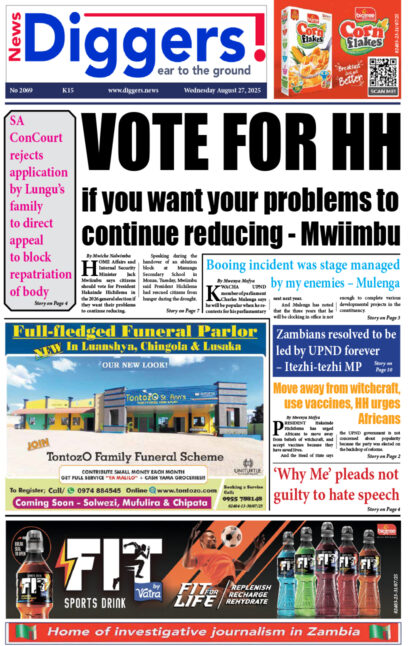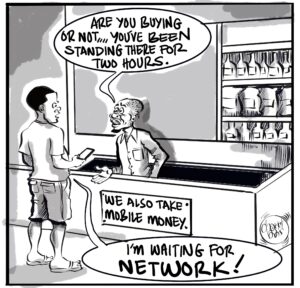Energy Minister David Mabumba has admitted that the increment in electricity tariffs was to a larger extent determined by politics and emotions.
And Mabumba says it was the responsibility of the electricity consumers to make Zesco financially viable.
Featuring on ZNBC’s Sunday Interview, Mabumba told programme host Grevazio Zulu that government saw it prudent to increase the tariffs by 75% for domestic consumers before the cost service study was concluded.
The minister had earlier explained that the cost service study was meant to provide clear guidance of how much Zesco and independent power producers spend to produce electricity.
Grevazio asked the minister why the government was working in reverse; allowing a tariff increase before the study was done and wondered if politics played a factor in the decision.
“Grevazio, I am going to answer you this question very straightforward. Politics, to a larger extent, has been a factor in this process… For now, probably the tariff setting in Zambia is characterised by emotions,” Mabumba said.
And Mabumba said it was the consumers of power who were supposed to make Zesco financially viable.
“It is the industry that is supposed to make Zesco viable because they are the consumers of Zesco’s power. So you and I and the Zambian people at large, we have got a larger part to play in terms of making the recapitalisation of Zesco because we consume their product,” Mabumba said.
Grevazio then asked the minister to explain why Zesco has not migrated staff tariffs to regularised tariffs despite being ordered by ERB.
Mabumba admitted that Zesco had inefficiencies.
“We need as a country to accept some of our own inefficiencies. If we accept that even Zesco has got inefficiency levels that we can address, why don’t we begin by addressing those inefficiencies? Because it is inefficiency levels that are going to make Zesco competitive and viable. I agree with you Grevazio about those weaknesses, but it is not a matter that we can deal with overnight,” he said.
“The cost of service study that is going to be undertaken is going to tell us where we are in terms of that. When they go to Zesco, they are going to focus on how much is spent on transmission, how much is Zesco spending on distribution, how much is Zesco spending on generation, including their head office. That is going to give government an empirical evidence as to weather the argument that is coming from people is genuine to say that the cost structure of Zesco is too high. But for now Grevazio, I wouldn’t want to attach emotions. I would rather wait for the study, because that is going to give me facts.
Mabumba then struggled to categorically state whether or not the PF government was going to unbundle Zesco and stated in the ruling party manifesto.
“Zesco given it’s strategic importance in this country, whatever reforms that you want to undertake, you have to be very cautious as government. This is why if you remember government privatised other companies, but on certain strategic institutions, which are also of security nature, government didn’t make those decisions,” he said.
“For me I like using the word competition and not unbundling. What is important, whatever terminology you attach to the issue of institution separation… because when you talk about institutional separation especially in the energy sector, you have to have a company that is in generation, a company that is transmission and a company that is in distribution. This is what our Kenyan colleagues have done.”
But Grevazio pressed the minister to give a clear position on the proposed unbundling of Zesco, to which Mabumba struggled to explain.
“As government, we don’t want to attach emotions to this concept of creating competition in the electricity subsector. We would like a study done that can inform government in terms of the way forward. The question of copy and paste, this country has sometimes run itself into problems. We concessioned Zambia Railways, you know what happened,” he said.
Grevazio then quoted a 2009 Parliamentary Committee on Economic Affairs: “These are expert opinions coming from Economics Association of Zambia, Zambia Development Agency and even the parliamentary committee minister and I quote: ‘Zesco which is a major player in the sector is inefficient and undercapitalised with a bloated management structure. Zesco needs to be restructured by unbundling it into generation, supply and distribution. In the PF manifesto, 2011 to 2016 you committed that you were going to unbundle Zesco, 2016 to 2021, the same. Is it just lip service? Six years in power and you still want to commission studies, is this not just lip service?” asked Grevazio as the minister fumble for words.
“Government is committed to the modernization of Zesco and that modernization is going to happen between 2017 and 2021. I don’t want to use the words unbundling, but its going to happen. This minister you are talking to is a minister who likes to do things differently. So as long as I have the backing of the people and my colleague in Cabinet, we are going to do it,” said Mabumba.
























